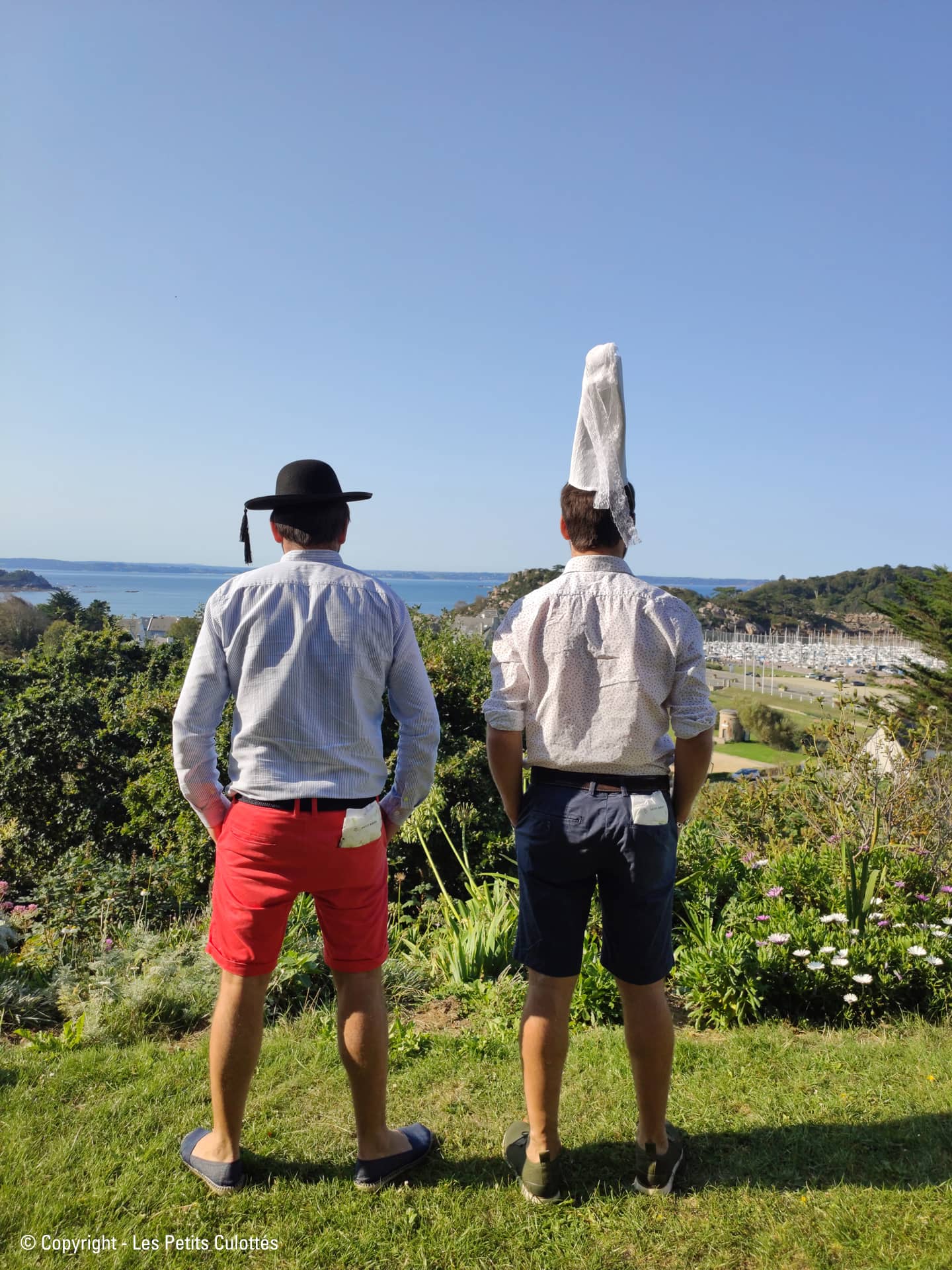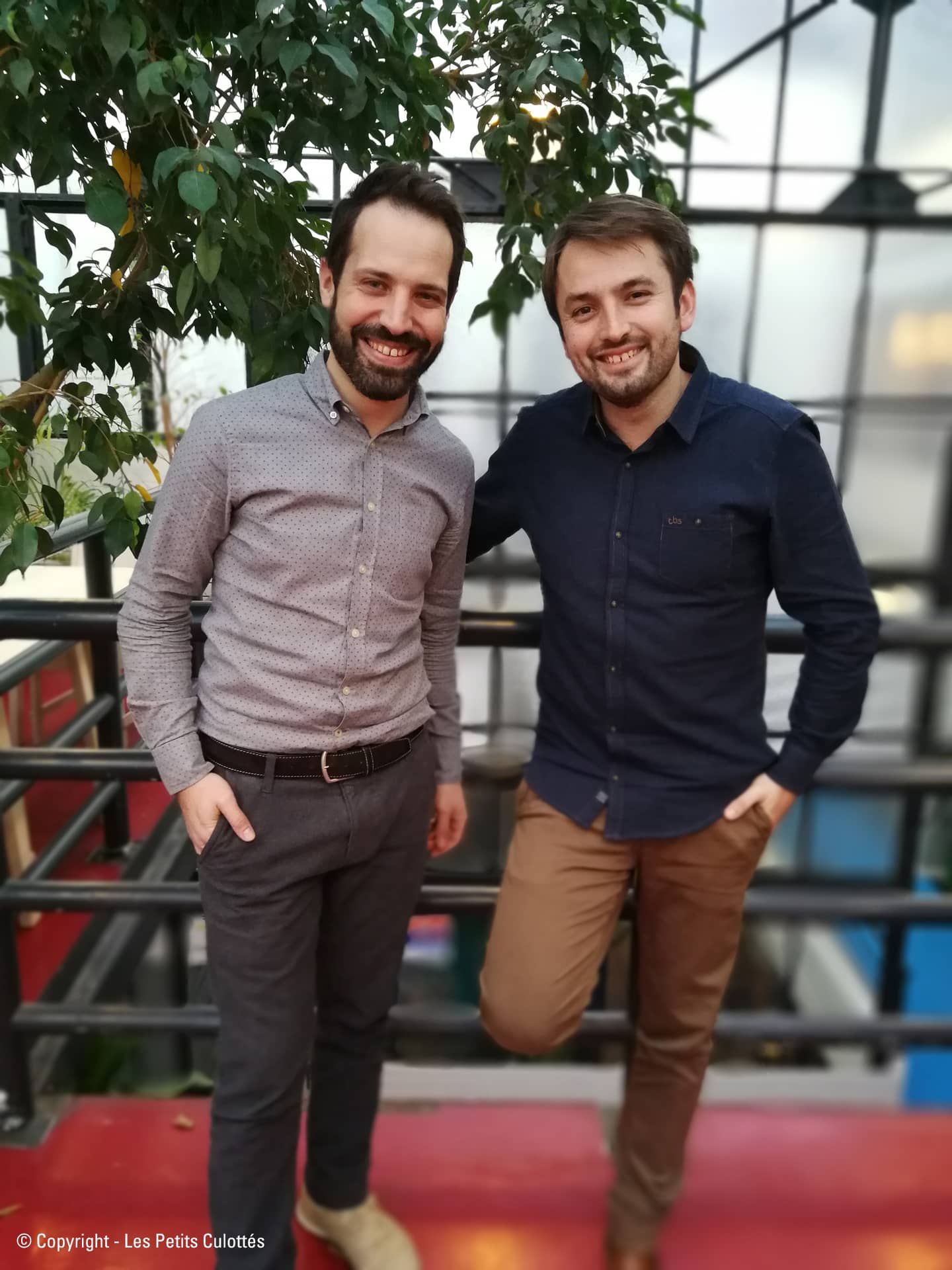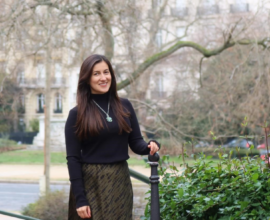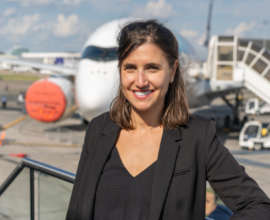Johan Bonnet
Changing the world one nappy at a time
![]() Reading Time: 10 minutes
Reading Time: 10 minutes
Co-Founder of Les Petits Culottés
Interview conducted in 2022. Johan currently manages Les Petits Culottés and his second brand Les petites Choses from Pornic.
Les Petits Culottés is the first eco-friendly nappy brand distributed through direct sales and short sales channels in France. Its sister company “Les Petites Choses” offers a range of organic feminine hygiene products and is engaged in fighting period poverty. At first glance, one might expect the company to be headed by a “mompreneur” who started a lifestyle business after having her children… Meet its co-founder Johan who is anything but. A farmer’s son, with a bachelor’s degree from Audencia, he learnt the ropes of the FMCG trade among the international giants. At the age of 31, motivated by a longstanding itch to start his own business, as well as solid ethical principles, he launched Les Petits Culottés.
Back then, he didn’t have children and couldn’t even tell the front of a nappy from the back! Going against all the entrepreneurship rulebooks, Johan started the company with his close friend – and fellow Audencia alum – Matthieu Batteur. This pair of bearded young men has now become the Ben and Jerry of the French eco-nappy market. It’s not the economic success that Johan mentions first when asked about his proudest accomplishments, but his satisfaction that his employees come to work with a smile on their face each morning. Maybe the office etiquette that bans shoes and encourages pattern socks is a contributing factor… “It puts us all on an equal footing,” he jokes.
We discover an entrepreneur with a big heart and ambitious dreams, yet with his feet firmly on the ground. At 34, Johan exudes remarkable wisdom and a cool head. He shares his personal recipe for success with us, based on high moral standards, respect, self-preservation, and a vow never to take himself too seriously.
Is there anything in your background that can explain why you have chosen the path that led you to where you are today?
I come from the Vendée, a rural region in western France, where my father farmed and my mother was a leather worker. At first glance, it would appear that I have taken a completely different direction to my parents. However, I can clearly identify the values that I have inherited from them. My father taught me the importance of common sense and hard work, both essential to survive as a farmer. I come from a home where it was important to be humble and to be aware of the value of things.
I suppose that my ecological awareness comes from growing up in the countryside. However, it’s only now that I live in Paris that I have realised how I miss living in an environment close to nature, where life is simpler.
As for my liberal views on gender equality, my parents were good role models and displayed a rather modern approach. I am lucky that my family members have been supportive with my life choices.
What were you like as a child?
It depends on who you ask! My friends saw me as sociable and fun loving. My parents would tell you that I was boisterous and needed boundaries. However, my teachers would remember me as a focused and engaged pupil.
Why didn’t you choose farming as a career?
Farm life and its symbiotic relationship with nature appealed to me, so I did consider this option but the financial perspectives were too precarious. I enjoyed school but I needed to find purpose and practical applications to remain motivated. One day when I was in high school, I visited the library to browse through job descriptions. I discovered the buyer’s role and I liked how it sounded; outward looking and transversal. I imagined that it would fit my personality, as it requires resilience, as well as an inquisitive nature in order to come up with insightful competitive intelligence.
How did your experience at Audencia have an impact on you?
The best thing that I got out of Audencia has to be meeting Matthieu Batteur. We met during our first year back in 2005, immediately clicked, had a few wild nights out and became close friends. We also happened to cross paths professionally after we graduated, and the rest is history!
Apart from the high quality academic and practical training from the school, my other take homes are the countless moments of intense friendship. These years were genuinely some of the most powerful and vivid moments of my life.
Why did you decide to start your career in some of the world’s largest multinationals?
When it came to procurement, these companies appeared to have the most advanced strategy. I joined L’Oréal as a buyer, then LVMH, and finally Kraft-Mondelez. In this last role, I discovered the American corporate culture at its best: when you prove that you are motivated and competent, you get promoted quickly.

What motivated you to take the leap and set up your own company?
After 6 years at Mondelez, I felt that I’d covered the main aspects of my job. I didn’t feel challenged enough, and I knew that others could deliver results as well as me. I felt too young to see my motivation and pleasure falter and by then, several of my friends had shifted into entrepreneurship. This career path fascinated me, and I itched to make the move too but annoyingly, I was lacking a concept.
Luckily, a combination of events played out in my favour. At Mondelez I had the opportunity to go for voluntary redundancy. Then my friend Matthieu Batteur who was working for Gilbert – a leading pharmaceutical company specialising in baby products – asked me to advise him as a procurement consultant. The decision to set up my consultancy firm was relatively easy because I didn’t have much to invest, my risk was low, and at 30 I knew I could bounce back if I failed. My plan had always been to use this as a stepping-stone to generate some revenue that I could invest in setting up my own brand.
Shortly after that, Matthieu suggested we go into an entrepreneurial project together. The advantage was that he had come up with a strong concept for a baby nappies product that his lab wasn’t interested in developing. Matthieu called me on Christmas Eve 2017, and two years later we launched Les Petits Culottés.
Would you say that you set up your company as a knee-jerk reaction against the large corporations you’d worked in previously?
I am well aware that we couldn’t have launched our business so successfully without the experience gained at mega companies, so I certainly won’t bite the hands that fed me. However, I am convinced that the quality of the products they offer must be addressed. Historically, nappies have been produced using petrochemicals because the materials are cheap and stable. However, scientific studies are unequivocal; there is also a negative impact on consumers’ health. The whole business model, based on price wars, high margins for mass distribution, high volumes and cheap raw materials, has to evolve quickly and soon. It is challenging for such huge vessels to pivot whilst maintaining the same financial performance.
In a sense, it was easier for us because we were aware of these issues from the get-go. Our CSR principles and our financial model are not contradictory, and we don’t have any shareholders to fight against. Fortunately, more and more consumers realise that their credit card can be used as a ballot paper. As long as they have access to information and alternative products, they have the power.
How did you come up with the concept for Les Petits Culottés?
When we first started to research the market, we were hugely surprised to discover the lack of regulations in the baby hygiene sector. And we weren’t even parents yet! It is insane when you think that these products come into direct contact with a baby’s sensitive skin. The product composition is opaque, and studies have shown that the big manufacturers’ products contain endocrine-disrupting chemicals.
We also learnt that less than 5% of nappies bought in France are manufactured here. Our vision from the outset was to produce in France using healthy, natural, and, of course, highly absorbent materials. We also made a point of making our products accessible price-wise, the trickiest objective to achieve. To bring our costs down, our strategy was to cut out all the intermediaries and to sell from the manufacturer straight to the consumers. This is where my rural common sense came in handy! We ended 2021 with 30,000 subscribers, 15M€ turnover, a dozen permanent employees, about 60 million nappies coming off the factory lines, and above all, a viable business.
Why did you decide to branch out into feminine hygiene products?
Many mothers who were fans of our nappies came to us enquiring whether we offered a feminine hygiene range with similar qualities. This sector is equally poorly regulated, so this is why we came up with “Les Petites Choses”, a 100% organic cotton range. Our products are available for free in about 2,000 dispensers in partner schools and universities and we are also present in more than 3,000 pharmacies in France. We are very proud to be part of the fight against period poverty among students.
Are you competing against Jho, the organic feminine hygiene brand, founded by fellow Audencian Coline Mazeyrat?
We have a different pricing and distribution strategy from Jho. However, there is plenty of space on the market for players like us, and I actually consider that our main competitors are the historical leaders. Ultimately, we need the eco-friendly sector to take over, and growing side by side with Jho is a good sign!

By going into business with your best friend, you have given the lie to the saying “Don’t mix business with pleasure”. How do you make your partnership work?
Personally, I would find it much riskier to partner with someone I have only just met rather than with a friend I have known for 15 years. Entrepreneurship is intense and often stressful: it’s important to have someone to share the responsibility for decisions. Our strength is that we have complementary talents and interests. The way we split the workload came naturally. Matthieu has a salesy temperament, so he excels in the commercial and marketing side of things. I have an analytical mind, which led me to look after the manufacturing, logistical, and legal operations.
When we started Les Petits Culottés, we had no product to show and the project consisted of a few slides; the risk that we were asking our potential partners to take was high. I believe our duo’s complementarity and the determination that we exuded were essential in winning their trust.
We don’t agree on everything though… which is healthy! Our partnership is strong, but, as in any relationship, it needs to be nurtured. We set aside two weeks every year to retreat to the countryside, take stock of what we have accomplished, ensure each other’s buy-in on future decisions and maintain a coherent path towards our dream.
What professional achievement are you most proud of?
I think I’ve achieved a good balance with my personal life, which was not a slam dunk because we launched the company just when my baby was born. For the company to be long lived, I am aware that I need to go easy on myself. Having a close-knit support network is equally essential: I know I can rely on my friends and family at challenging moments.
I am also proud of the fact that every day when I step into the office, people greet me with a smile. The economic impact we are making is gratifying. We have not just generated jobs, we have contributed to re-industrialising Brittany and the Vosges regions where the two production sites are located. For some of our products we are even partnering with a vocational centre that employs about 20 people with disabilities.
I could also mention our 1,600 5-star rating reviews on Google. Knowing that so many parents love our brand values and that our products help them have nights that are more peaceful is a real boost. I am always baffled that so many customers take the time to write messages of appreciation. One mother, who had just cancelled her subscription because her child was now potty-trained, felt she had to write to us to explain. She said that she was so fond of our company that she almost considered having another baby! Last week, another one wrote “Les Petits Culottés is the best thing that came out of the Vosges region aside from the world-famous Munster cheese”. This is simply the ultimate praise!
Let’s jump in with both feet: you are in a field where we would expect to find women. What do say to those who might think that you lack legitimacy in your understanding of women’s concerns?
Actually, being a man in this field tends to put a smile on people’s faces, and that’s a plus, which has helped get us noticed. We have always positioned ourselves as the cheeky challengers who want to shift the lines. The good news is that they already have: just look at the paternity leave terms that are being extended in several countries. Fathers have opinions and new ideas to share. And mothers actually appreciate men being involved, including in feminine hygiene products. The objective is to achieve progress together by minimising our environmental impact, re-localising, and closing the gender gap. For this, we need all genders on board.
After discussing tampons and newborns’ stools all week long, do you compensate by pumping iron, fixing cars and going hunting at the weekend?
No, there’s no testosterone surge on Friday evening! Quite the opposite: working in this field has made me broody and encouraged me to have children. It also motivated me to learn more from women. Both Matthieu and I are totally at ease with our roles.
What piece of advice would you share with Audencia students and alumni who are thinking about setting up a purpose-driven company?
Don’t believe that entrepreneurship is the only road to success. You can find fulfilment as a company employee. Don’t over-plan, and take experiences one at a time. If you do decide to set up your own venture, don’t underestimate the importance of a viable business model. Dig out your notes from your Audencia years.
Working for a passion or a cause and not just for profit is highly rewarding and your enthusiasm will help you to convince and motivate people around you. But be mindful not to lose yourself. For me, there can be no satisfaction in achieving professional success on its own.. My biggest nightmare would be to realise in 20 years’ time that I have missed out on my daughter’s childhood. So, be ruthless in managing your time, which will be hard at the beginning. Even more so when you’re working from home because of the blurred boundaries. Find time to squeeze those sport breaks into your diary, and carry on reading and staying curious.
If your career goes absolutely as per plan, where would you like to be in 10 years?
I have benefitted from mentoring and in a few years’ time I want be able to give back and share my expertise*. I hope that Les Petits Culottés will be going strong and will even grow: it would be a great sign that the whole economic model has evolved. I would want to see it carrying the same values and be an environment where employees still smile. Hopefully by then my parents will have stopped asking when I will become a fixed-wage employee!
*Since the interview, Johan has become patron of the Audencia Bachelor class of 2024 programme.

